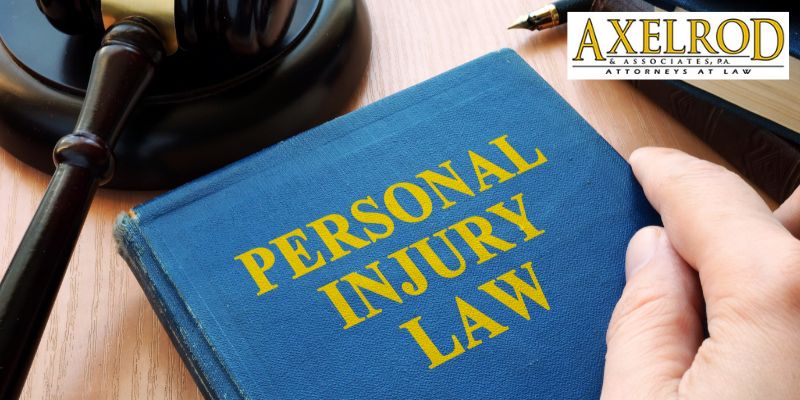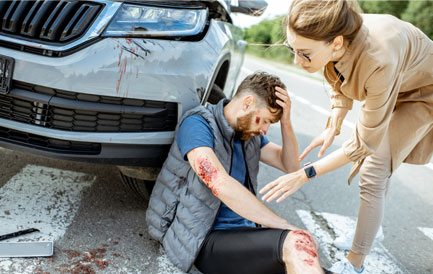4701 Oleander Drive, Suite A
Myrtle Beach, SC 29577
4701 Oleander Drive, Suite A
Myrtle Beach, SC 29577
Loris Personal Injury Lawyer
Loris Personal Injury Attorney
Few things can be more frustrating and even tragic than when someone is injured through no fault of their own but as a result of the carelessness or malice of another. When that happens, the injured often end up suffering in a myriad of ways, from financial loss to devastating mental, emotional, and psychological damage. We are owed compensation for our losses. However, that compensation is not easily forthcoming from those who owe it. Often, it takes legal action, or at least the believable threat of it, to get parties to give up what they owe. Axelrod & Associates, P.A., has the Loris, SC, personal injury attorneys who can help you seek what you’re owed through a personal injury claim.

Personal Injury Claim
A personal injury occurs when some entity, either out of neglect, recklessness, or intent, physically or psychologically harms another person. When this happens, the injured are due restitution from the injurer. A personal injury claim is a civil action that can be used to pursue that restitution when it is not readily forthcoming. Some common examples of things that result in personal injury claims include:
- Car Accidents
- Truck Accidents
- Motorcycle Accidents
- Medical Malpractice
- Dog Bites
- Boating Accidents
- Slip and Falls
- Premises Liability
- Nursing Home Abuse
- Product Liability
- Sexual Assault
Statute of Limitations
The statute of limitations in personal injury law sets a limit to how far after the injury a person can file a claim against the party that caused it. In South Carolina, that limit is three years. It’s important to get in contact with a personal injury lawyer quickly after your injury. The more time they have to investigate and negotiate before that three-year limit runs out, the better the chances of you getting everything you’re owed.
Be Cautious
In many cases, liability claims are paid out by insurance companies. You must be very careful when communicating with them, as they will often seek to find anything they could argue is evidence of your fault in the injury. Your personal injury lawyer should be able to help you manage this communication or even communicate on your behalf.
Proving Fault
The most important part of a personal liability case is proving fault. Only once you prove fault can you then make a claim for damages related to the injury. Fault in personal liability cases comes from demonstrating negligence on the part of the defendant. This requires proving three things:
- Duty – The first thing you need to be able to demonstrate is that the defendant had a duty to be mindful of those around them and to take actions to protect or mitigate the risk to those around them. Often, if the injury occurred in a place where there is a reasonable expectation that others may be present, this is the easiest part of negligence to prove.
- Breach of Duty – You must be able to show that the defendant failed to meet the duty required of them. Typically, this means that they failed to act as a reasonably careful person would have in their situation. This can be a more challenging part of the process, as it requires proving both what the defendant did or did not do and proving that their action varies from what they should have done.
- Causation – Finally, you must be able to show that the defendant’s breach of duty led directly to the injuries sustained. The difficulty of proving this element can vary significantly from case to case depending upon the evidence available and the nature of the injuries.
Damages
Once negligence is proven, you can argue for damages. You must be able to show, though, that the injury is the direct cause of the loss for which you are seeking damages. The damages you may receive fall into three categories:
- Economic damages address the losses you experienced that are, more or less, easily calculable. If it’s something that has a price associated with it, including wages, it’s handled under economic damages. Therefore, things like lost wages, lost future earning capacity, medical bills, and property damage are all covered by economic damages.
- Non-economic damages address losses that aren’t calculable and don’t have a price tag associated with them. They are meant to compensate for the more emotional and psychological losses that come with injury, so things like mental anguish and pain and suffering are given a value here that the defendant is required to pay.
- Punitive damages are a third category of damages that are not directly related to any loss that the injured has experienced. They are not awarded in every case. These damages are meant to act as a punishment and deterrent if the court feels that the defendant acted maliciously or excessively recklessly.
Shared Fault
One way your damages could potentially be limited is through the modified comparative negligence system that South Carolina follows. What this means is that the defense may try to argue that you were also negligent and at least partially responsible for the injuries you suffered. If the court finds that you were partially responsible, then the damages you receive will be discounted according to that responsibility. As an example, imagine that the court finds that you are 30% responsible for your injury. In that case, you can only recoup 70% of the damages.
Damage Caps
Another potential limitation on the damages that you could receive is damage caps. In the case of medical malpractice, there is a $350,000 cap on non-economic damages. In all injury cases, there is also a limit on the potential punitive damages, which is the greater of $500,000 or three times the total value of economic and non-economic damages combined.
Personal Injury Attorneys FAQs
Q: What Is a Personal Injury Claim?
A: A personal injury claim is a civil claim against another individual or entity for having caused you injury. It could be a car accident, assault, medical malpractice, dog bite, or any other type of injury. If the court finds that the defendant is at fault for the accident, then you could be awarded damages that cover everything from medical bills to mental anguish. These kinds of cases require a thorough investigation and making a case for negligence on the part of the defendant. It’s important to have high-quality legal representation to better your odds of winning your case.
Q: What Are the Damages for Personal Injury in South Carolina?
A: The damages that you may be awarded in a personal injury case fall into three general categories:
- Economic Damages – These are damages that cover the cost of quantifiable losses from the injury. They cover things like medical bills, lost wages, property damage, and future lost wages.
- Non-economic Damages – These are damages that cover the cost of unquantifiable losses from the injury. They cover things like mental anguish, pain and suffering, loss of consortium, or disfigurement.
- Punitive Damages – These damages are not awarded in every case. However, if the court determines that the defendant caused you injury with malice or in some particularly egregious manner, the court may choose to award additional damages that are meant to act as a punishment or a deterrent against similar behavior in the future.
Q: What Is the Statute of Limitations for Personal Injury in South Carolina?
A: In South Carolina, the statute of limitations for personal injury claims is, with very rare exceptions, three years. This means that the case must be filed within three years from the date of the injury. Be aware of this date, as it is not unheard of for insurance companies to try to run out the clock on this date if you are negotiating with them. Always be sure to have a lawyer examine your case before you make any agreement with an insurance company.
Q: How Does South Carolina’s Modified Comparative Negligence Work?
A: South Carolina determines fault and damages through something called modified comparative negligence. What this means is that your total damage award may be limited if you are found to have any part to play in your injury. For instance, if your injury is determined to be 10% your own fault, then the most you can collect in damages is 90% of the award. If you are found to be more than half responsible, then you won’t be able to collect any damages for the case. This is why you must be particularly cautious when discussing the case with anyone aside from your lawyer. A good lawyer will also anticipate the arguments for your fault and attempt to counter them.
We Can Help You Fight for What You’re Owed
When we are injured, it often comes with a significant cost. Legally, we are owed compensation for what we’ve undergone. Unfortunately, those who are required to pay that compensation are often unwilling to do so. More than likely, you are going to have to fight for what you are rightfully owed. Fortunately, you don’t have to do that alone. Axelrod & Associates, P.A., is ready to stand and fight with you. We can investigate your case, put together a strong claim for what you deserve, negotiate on your behalf, and, if needed, argue your case in court. Contact us today, and let us take a look at your case.
Need help? Contact Axelrod & Associates, P.A.

Request your
Consultation
The fields marked with * are mandatory.






